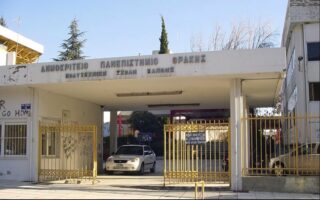Investigation launched into death of Pakistani national in Athens police custody

A preliminary investigation is underway by the Agios Panteleimonas Security Department concerning the death on September 21 of a 37-year-old Pakistani national, Muhammad Kamran Ashiq, inside the police station of the central Athens neighborhood.
The official autopsy report lists the cause of death as “undetermined,” noting “prior beating” and pending results from additional laboratory tests. The body exhibited extensive bruising.
Family lawyer Maria Sfetsou tells Kathimerini that Ashiq likely died from an ischemic episode resulting from the beating, but further tests are necessary to confirm this. She plans to request that the investigation be transferred to another authority, citing concerns about a potential conflict of interest since the current probe is being conducted by the same department located within the police station where the incident occurred.
According to Sfetsou, Ashiq had been living in Greece since 2004, spoke fluent Greek, and had held legal residency documents since 2019. “Despite this, the police report inaccurately labeled him as homeless, unable to speak Greek, and without legal papers,” she says.
Ashiq was arrested on September 13 after a domestic violence complaint was filed against him by a Greek woman. Due to overcrowding, he was transferred between several police stations for several days before being held at Agios Panteleimonas. Although his court hearing for the domestic violence charge was postponed, he remained in custody for verification of his legal status. His lawyer says that his legal documents “could have been confirmed with a phone call, which he was denied.”
Ashiq was released on September 17 after his residency status was confirmed. However, later that evening, he was stopped again by police officers from the DIAS motorcycle unit for an identity check and was re-arrested a few hours later around 12.30 a.m. for resisting arrest.
The exact circumstances surrounding his second arrest remain unclear. Sfetsou claims the police report lacks details regarding the time and location of his apprehension. “His family was searching for him in hospitals and police stations before they were informed of his death on September 21,” Sfetsou says.
Evidence indicates that Ashiq was already injured before arriving at the Agios Panteleimonas station. Emergency medical services were called to the scene but determined he did not require hospitalization – a decision that the lawyer contests, given the severity of his injuries. “He could not have died from natural causes,” she says, noting that they are seeking out the staff of the EKAV ambulance service that responded that day.
The family’s forensic expert, Asteria Papavdi, found that Ashiq sustained two types of injuries: older wounds from at least five days prior, and more recent injuries inflicted within 4 to 48 hours before his death, likely while in custody at Agios Panteleimonas.
Video footage from police stations, standard procedure in such cases, could be critical. However, police stated that Ashiq was held in a temporary detention room not covered by surveillance cameras. Sfetsou casts doubt on the police’s claims.
According to the police, initial findings indicate that Ashiq was involved in a minor altercation with other detainees, leading to his placement in a separate holding area, where he was found dead in the early morning. Authorities have collected DNA samples from the detention area, and sworn statements have been taken from those allegedly involved. The toxicology report is still pending.





